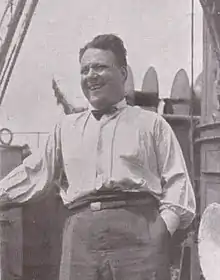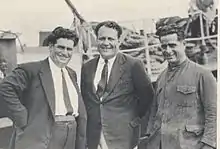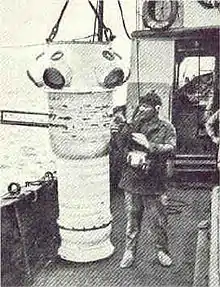Alberto Gianni
Alberto Gianni (26 April 1891 – 7 December 1930) was an Italian underwater diver and inventor.
Alberto Gianni | |
|---|---|
 Alberto Gianni aboard the Artiglio | |
| Born | 26 April 1891 |
| Died | 7 December 1930 (aged 39) |
| Nationality | Italian |
| Known for | Underwater diver, inventor |
Early life and career
Gianni was born in Viareggio, Tuscany, Italy. He served as a soldier during the Italo-Turkish War and World War I, becoming a diver after seeing divers on warships. In 1911 he plugged a leak on the Italian battleship Regina Elena after it had collided with the Saint-Bon in stormy seas. In 1916 he suffered from decompression sickness after participating in a submarine recovery in La Spezia.[1]
Diving equipment
Gianni is best known for building a decompression chamber, which he called the cassa disazotatrice, in 1916.[1][2][3]
Another of his major achievements was the "torretta butoscopica", (direct translation: exploration turret), a one-man atmospheric pressure underwater observation chamber deployed by a lifting cable from a ship, provided with a telephone, and supplied with breathing air from the surface, which he designed, built and tested.[1]
Recovery operations
Gianni gained international fame for his work as a diver. He worked on the case of the Spanish steamship Cruz, sunk on Scoglio del Catalano (Catalan Cliff) on the west coast of Sardinia. Because the shipwreck seemed suspicious, British insurers sought divers able to check it, but none accepted the job due to its technical difficulty. Gianni accepted on condition that he would receive twice the compensation offered because of the difficulty of the job. The request was accepted and Gianni accomplished his task, finding the intentional nature of the shipwreck. He then appeared in court in London to confirm the findings, earning recognition for himself and the superiority of Italian divers.[1]
Another famous case was the recovery in Lake Como of the Lariana company's boat Lecco, sunk on the evening of 18 February 1927 in the port of Como.[1]
Gianni's most widely known achievement was probably the discovery of the wreck of the SS Egypt, sunk in the Atlantic Ocean off the coast of Brest in Brittany, France, at a depth of about 120m and carrying a precious cargo of gold bullion and silver. Attempts to locate the ship and recover the treasure had been made by the most famous companies of the time. In the end Lloyd's of London commissioned the credible and organized SO.RI.MA. ("Society for Maritime Recovery") founded by Commendatore Giovanni Quaglia, who finally succeeded with the recovery ship Artiglio ("Talon"), on which Gianni worked as chief diver and underwater operations manager. His exploits were described by journalist David Scott, who followed all the events of recoveries on behalf of the SO.RI.MA. company for The Times of London, living aboard its ships and writing numerous articles and two books.
Death

After locating the SS Egypt, due to bad weather and the inability to carry out its recovery, while waiting for suitable weather conditions, the SO.RI.MA. company got the job to carry out some recovery operations near the island of Belle Île, south of Brest, sending the ship Artiglio with Gianni as head of operations. Gianni died on 7 December 1930 during the dismantling of the SS Florence H., sunk full of explosives and ammunition. The Artiglio was swept away, destroyed and sunk by the explosion. Two other famous divers, Alberto Bargellini and Aristide Franceschi, and nine other crew members perished with Gianni.[4][5] The tragedy occurred at a time of great euphoria given the real possibility of recovering the valuable sunken treasure of the Egypt.
The gold of the Egypt

The recovery of the Egypt's treasure was then carried out by the SO.RI.MA. company outfitting a new ship, called the Nuovo Artiglio, for the occasion.[6] The operation achieved a resounding success at the international level since it was the first step in the world of deep-water recovery, something considered impossible at the time, carried out by Italian divers and which became possible thanks to the organization left by Gianni and the use of his inventions, especially the "torretta butoscopica". Congratulations were sent from all over the world, including from George V (King of the United Kingdom), Benito Mussolini, and then-communications minister Costanzo Ciano.[7]
See also
References
- Tegani, Ulderico (1931). Viaggi nel mondo sommerso [Travel in the underwater world] (in Italian). Milan: Mondadori. Archived from the original on October 12, 2008.
- Scott, David (1931). Seventy Fathoms Deep. London: Faber & Faber Limited.
- Scott, David (1932). The Egypt gold. London: Faber & Faber.
- "Salvage ship disaster". The Times. No. 45691. London. 9 December 1930. col A, p. 14.
- "Casualty reports". The Times. No. 45691. London. 9 December 1930. col E, p. 24.
- "La leggenda dell'Artiglio" [The legend of the Artiglio] (PDF). Lega Navale (in Italian): 19–24. July 2007. Archived from the original (PDF) on 21 November 2008. Retrieved 14 October 2012.
- "L'avventura che stupi il mondo" [The adventure that astonished the world]. Il Giornale (in Italian). 30 August 2006. Retrieved 14 October 2012.
Bibliography
- Viaggi nel mondo sommerso (Travel in the underwater world) – Ulderico Tegani – Mondadori Milan 1931 – (ISBN not available)
- Seventy fathoms deep – David Scott – Faber & Faber Limited London 1931 – (ISBN not available)
- Ed. it. "Con i palombari dell'Artiglio" (With the divers of the Artiglio) – Treves Treccani Tuminelli – (ISBN not available)
- The Egypt gold – David Scott – Faber & Faber London 1932 – (ISBN not available)
- Ed. it. "L'Artiglio e l'oro dell'Egypt" (The Artiglio and the gold of the Egypt) – Mondadori – (ISBN not available)
- L'Artiglio ha confessato (The Artiglio has confessed) – Fabio Micheli – ISBN 88-8209-040-X – ed. Mauro Baroni 1997
- Alberto Gianni Capopalombaro dell'Artiglio (Alberto Gianni, Chief Diver of the Artiglio) – Boris Giannaccini – ISBN 9788896915219 – Ed. Ist. Ellenico Studi Bizantini 2011
External links
- "Artiglio Europa Fondazione Onlus". Archived from the original on 23 July 2008. Retrieved 11 October 2012.
- "Okeanos – Storia della subacquea – A. Gianni, l'innovatore" [A. Gianni, the innovator] (in Italian). A. S. D. Okeanos. 2002. Archived from the original on 12 October 2008. Retrieved 13 October 2012.